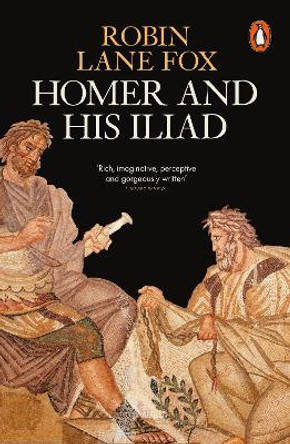Description
Longlisted for the RUNCIMAN AWARD, 2021
Medicine is one of the great fields of achievement of the Ancient Greeks. Hippocrates is celebrated worldwide as the father of medicine and the Hippocratic Oath is admired throughout the medical profession as a founding statement of ethics and ideals. In the fifth century BC, Greeks even wrote of medicine as a newly discovered craft they had invented.
Robin Lane Fox's remarkable book puts their invention of medicine in a wider context, from the epic poems of Homer to the first doctors known to have been active in the Greek world. He examines what we do and do not know about Hippocrates and his Oath and the many writings that survive under his name. He then focuses on seven core texts which give the case histories of named individuals, showing that books 1 and 3 belong far earlier than previously recognised. Their re-dating has important consequences for the medical awareness of the great Greek dramatists and the historians Herodotus and Thucydides. Robin Lane Fox pieces together the doctor's thinking from his terse observations and relates it in a new way to the history of Greek prose and ideas.
This original and compelling book opens windows onto many other aspects of the classical world, from women's medicine to street-life, empire, art, sport, sex and even botany. It fills a dark decade in a new way and carries readers along an extraordinary journey form Homer's epics to the grateful heirs of the Greek case histories, first in the Islamic world and then in early modern Europe.
About the Author
Robin Lane Fox is Emeritus Fellow of New College, Oxford, and taught Ancient History at Oxford University from 1977 to 2014. He is the author of Pagans and Christians (1986), The Unauthorized Version (1992) and many books on classical history, all of which have been widely translated, including Alexander the Great (1973), The Classical World (2005), Travelling Heroes (2008) and Augustine: Conversions to Confessions (2015), which won the Wolfson Prize for History. He has been the gardening correspondent of the Financial Times since 1970.
Reviews
In this engaging history by the biographer of Alexander the Great, lightened with wry donnish wit... readers can enjoy a vivid ride through a part of Greece little visited in either body or mind. -- Peter Stothard * Financial Times *
an exciting addition to a flurry of books on ancient medicine in recent years ... Lane Fox, who is known for his originality and his exceptionally broad interests as a historian, which range from Alexander the Great to Augustine, built The Invention of Medicine: From Homer to Hippocrates on a decades' worth of impressive scholarship ... His account of early Greek medicine is an engaging, well informed introduction to the complex reality of the world of healing in ancient Greece. Drawing on as many sources as possible, yet making complex data accessible to a wide audience, Lane Fox describes the skills of doctors and the experiences of their patients with gusto ... groundbreaking -- Caroline Petit * The Lancet *
My favourite book from our lock-down times is The Invention of Medicine by Robin Lane Fox, a great Oxford classicist's contribution to the most needed discipline of the day. By original and skilful argument, it shows how some of the direct observations attributed to Hippocrates, the 'father of medicine', dated by him earlier than most of us had thought before, influenced Thucydides and other writers at the very birth of reasoned history. -- Peter Stothard * Aspects of History Books of the Year *
a most welcome contribution to this ever-growing field by one of today's most eminent voices in ancient history. In his latest book, Robin Lane Fox, probably best known for his work on Alexander the Great and Augustine, offers a refreshing and at points ground-breaking revision of the beginnings of ancient Greek medicine ... In his attempt to disentangle and revise the 'invention of medicine' as a highly complex and multifaceted phenomenon in early medical history Robin Lane Fox succeeds brilliantly in constructing a narrative that is, at the same time, innovative and introductive, informative and entertaining, thoroughly historical yet with the occasional contemporary twist. Writing in an accessible style, aimed at both a general and informed readership and abounding in donnish wit, Lane Fox takes his reader on a scholarly joyride -- Michiel Meeusen * Bryn Mawr Classical Review *
Radically, Lane Fox is keen to date Books One and Three of the Epidemics very early in the story of the development of Greek medicine, much earlier than anyone else has done ... The case is ingenious ... He knows how to pace a narrative and he has a raconteur's eye for detail. -- Alastair Blanshard * Times Literary Supplement *
Lane Fox leads us down intriguing paths of epigraphy, political history, philology and archaeology -- James Romm * London Review of Books *
Robin Lane Fox's remarkable The Invention of Medicine brings to vivid life the island city of Thasos in the fifth century bc, when it was home to the author of books of case studies now called Epidemics I and 3, whose details are so forensic that we can diagnose his patients' ailments and pinpoint their addresses in the modern city. Around these works Lane Fox weaves a compelling history of Greek medicine, before arguing that they betray such scientific rigour that their author can be none other than Hippocrates himself. -- David Stuttard * Aspects of History Books of the Year *
Book Information
ISBN 9780141983967
Author Robin Lane Fox
Format Paperback
Page Count 432
Imprint Penguin Books Ltd
Publisher Penguin Books Ltd
Weight(grams) 326g
Dimensions(mm) 198mm * 129mm * 24mm





